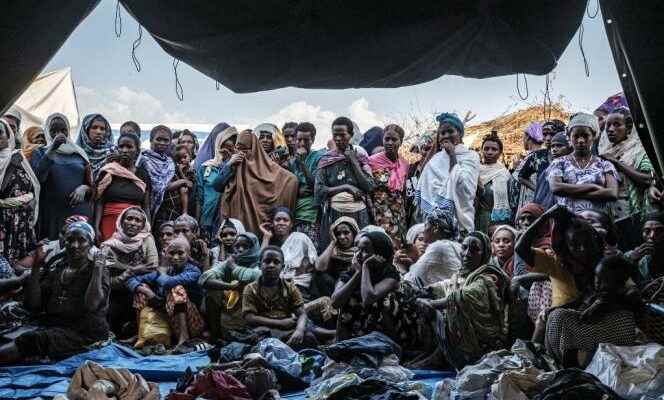To not miss any African news, subscribe to the newsletter of the “World Africa” from this link. Every Saturday at 6 a.m., find a week of news and debates covered by the editorial staff of the “World Africa”.
On November 4, 2020, the civil war in Ethiopia began. Two years later, what the World Health Organization (WHO) considers “the worst disaster in the world” caused thousands of deaths.
After ten days of negotiations in Pretoria, South Africa, the insurgents of the Popular Front for the Liberation of Tigray (FPLT) and the Ethiopian government pledged, Wednesday, November 2, to cease hostilities. A peace that “will not be sustainable” if the crimes committed over the past two years are not judged, warns Fisseha Tekle, specialist in the Horn of Africa within the organization Amnesty International.
For the first time since the start of the conflict, negotiations have officially started between the government and the rebels. Do you hope to see the situation improve in Tigray?
Fisseha Tekle Today, both sides say they are ready for peace, but I fear that they are limiting themselves only to negotiating a ceasefire and forgetting an essential element: human rights violations. The cessation of hostilities must absolutely rhyme with criminal responsibility, transitional justice and the return of humanitarian aid. Otherwise, peace will not be lasting. Unfortunately, everything indicates that human rights violations will continue.
No one has been tried or held accountable for the crimes committed. The culture of impunity is total. Fighters commit the same crimes over and over again. Since fighting resumed in August, Ethiopian army airstrikes have again targeted civilian areas. In September alone, in the town of Sheraro, 40 people were executed by the Eritrean army. And there are still no lawsuits.
At the origin of this conflict, there is a political dispute between the People’s Front for the Liberation of Tigray (FPLT) and Prime Minister Abiy Ahmed over the organization of the elections. Why has the situation gotten so bad?
When he was appointed prime minister in 2018, Abiy Ahmed decided to approach two historical enemies of the FPLT, which ruled Ethiopia for more than twenty years: Eritrea and the Amhara region. From the moment these forces engaged militarily in Tigray alongside the federal army, they took revenge on the Tigrayans, perceived as a whole as supporters of the FPLT. The region was devastated and many crimes and rapes were committed.
The largest massacre took place in November 2020, at the start of the war: Eritrean soldiers summarily executed more than two hundred civilians while going from house to house in the town of Axum. And that’s just the tip of the iceberg. Later, we observed the same feeling of revenge and retaliation when the Tigrayan soldiers ventured into the Afar and Amhara regions. They also committed serious abuses.
In your opinion, has the international community lost interest in this conflict?
Let’s say that if this war was taking place in Europe or elsewhere, we would probably have seen a different response. Certainly, access to information is difficult: telecommunications, Internet and electricity have been cut in Tigray for two years. Conflict is invisible, and the longer it goes on, the less attention it receives. That said, despite the communications blackout and the estrangement of journalists and organizations such as Amnesty International, we were able to document serious human rights violations. There is ample evidence for the international community to speak out and act.
We are talking here about war crimes and crimes against humanity, such as ethnic cleansing in western Tigray. Faced with these abuses, the attitude of the United Nations or the African Union is not up to par. So far, international institutions have been content with doing the minimum: appointing special envoys and setting up commissions of inquiry. But, in two years, the UN Security Council has never put Ethiopia on its agenda. As for the African Union, which has its headquarters in Addis Ababa, it has never put the Tigray war on the menu of discussions between heads of state.
The American Holocaust Memorial Museum, which has real expertise, believes that the risks of genocide are high in northern Ethiopia. Do you think that the current radicalization of speeches can lead to such a tragedy in Tigray?
Amnesty International does not exclude that a genocide is underway in Tigray, but we do not yet have sufficient information to confirm it. All the signs are there: ethnic cleansing, systematic sexual violence and, more generally, sharply rising hate speech that the authorities have taken no action to curb.
The Ethiopian government is trying by all means to present this conflict as a mission to maintain order in Tigray. But, since November 2020, everything indicates that it is a civil war, whether it is the intensity of the fighting and the presence of the Eritrean army, the magnitude of the mobilization, not to mention the massive use artillery barrages and airstrikes.
